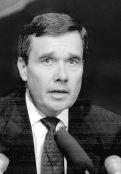FIRST SIGN, SEAL, and deliver a new police chief. Then let the public have its say. Is this a great democracy or what?
“Let me remind the public that we will accept some written questions if there’s anyone who wants to ask anything of the chief,” City Council member Jim Compton said at a confirmation hearing for new police chief Gil Kerlikowske last week. Compton read two softball questions from the public, which the polished Kerlikowske easily hit over the fence. “That seems to be all the letters,” Compton said. Welcome, chief. Next!
Of course, confirmation is a formality, and the council and mayor have held a few community forums over the past six months to see what Seattle wanted in a new chief. “But that’s hard to answer when you don’t know who the guy is yet,” says Jorgen Bader of the Seattle Community Council Federation, which sought to get citizens involved in the selection. “We want Superman and Dick Tracy, OK? At the least, the city should have been asking what we, specifically, would ask the candidate—on the use of lethal force, racial profiling, neighborhoods and so on—if we had the chance.”
Under the current process, the only questions that count are the mayor’s, and perhaps all the embattled Paul Schell really needed to know was which of the three finalists could save his job. Bill McManus, an assistant chief from controlled-riot DC, showed up still smelling of IMF tear gas, a little too redolent for the WTO’d mayor. And Madison police chief Richard Williams didn’t help himself by confessing to a Wisconsin reporter “I’m not dying to be the chief of police of Seattle.”
That left Kerlikowske, 50, a cop-cool, politically savvy, and White House-connected veteran of three decades of these kinds of law enforcement pageants (he has sought at least 11 police chief or federal law enforcement positions since the 1970s, winning five of them). Though Compton thought Kerlikowske “the best and brightest available,” Seattle hired the man that Tulsa, Gainesville, and Memphis didn’t. Most recently Kerlikowske was Buffalo’s police commissioner, then director of a Justice Department unit managing $8.8 billion in community-policing grants.
Despite Seattle’s internal scandals (the retrial of exdetective Sonny Davis, accused of theft, is set for next week), plus those messy justified cop shootings and unanswered complaints of excessive force, Kerlikowske thinks Seattle is not broken. He also wants to “move on” from WTO, feeling “self-agonizing [isn’t] healthy.”
Kerlikowske will be paid a record $140,000 to oversee 1,270 officers and a budget of $140 million. In return, the chief promises to make the SPD not only Seattle’s but America’s finest. But “you’re going to have to trust me for a little while” to shape things up.
Fair enough, even if this is just another line for his considerable resume. When he left Buffalo in 1998, Kerlikowske said he wasn’t interested in another chief job, and a year later called his new federal role “a wonderful change.” But there he was last week, accepting another chief position and another wonderful change. A word of advice, though: One of the chief cofinalists, Williams, says that during his visit here he cheerfully tried to strike up a conversation with a woman on a bus. Her response? “Mind your own fucking business!” Seattle’s a different kind of wonderful these days, chief.








